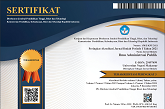The Study of Human Resources Management Practice on Corporate Social Responsibility
(1) Universitas Mercu Buana
(2) Universitas Mercu Buana
(3) Universitas Advent Indonesia
(4) Universitas Pamulang
(5) Universitas Pamulang
(*) Corresponding Author
DOI: https://doi.org/10.26858/jiap.v11i1.21849
Abstract
The topic of corporate social responsibility and human resource strategy has developed together in the study as well in practice in a business environment. Both have become very powerful tools within the company to achieve sustainable growth for the company. Corporate social responsibility deals with labor-related issues, such as human rights, labor practices, health care, and the environment, and others, while implementing a good human resource strategy will support the practice of corporate social responsibility to be more effective, meaning that there is a mutual relationship among them. Companies that implement corporate social responsibility properly will pay attention to efforts to work legality at the company and improve company performance and more adequate business sustainability. This research has shown that adequate human resources management practice would significantly increase the company's corporate social responsibility.
Keywords
Full Text:
PDFReferences
Andrei, J. V., Panait, M., & Voica, C. (2018). Challenges and Approaches for The Corporate Social Responsibility and Human Resource Management in The Financial Sector. Economics, Management and Financial Markets, 13(3), 415-431.
Cannon, T., (1994). Corporate Responsibility: A Textbook on Business Ethics, Governance, Environment, Roles and Responsibilities. London: Pitman.
Calderón, G. (2006). Human Management and its contributions to Colombian organizations. Administration Notebooks, 19(31), pp. 9-55.
Calderón, G., Naranjo, J., & Álvarez, C. (2011). Role of Human Management In The Fulfillment Of Corporate Social Responsibility. Management Studies. 27 (118), pp. 163 – 188.
Crane, A., Matten, D., & Spence, L.J., (2008). Corporate Social Responsibility: Readings and Cases in a Global Context. London: Routledge.
Del Baldo, M. (2013). Corporate Social Responsibility, Human Resource Management and Corporate Family Responsibility. When A Company Is The Best Place To Work: elica group, the hi-life company. Ekonomska Istrazivanja, 26(1), 201-224.
Freeman, R.E., (1984). Strategic Management: A Stakeholder Approach. London: Pitman
Friedman, B. A. (2009). Human Resource Management Role Implications for Corporate Reputation. Corporate Reputation Review, 12(3), 229-244. doi:http://dx.doi. 10.1057/crr.2009.17
Fuentes García F.,J., Núñez Tabales, J.,M., & Veroz-herradón, R. (2008). Applicability of corporate social responsibility to human resources management: Perspective from spain: JBE. Journal of Business Ethics, 82(1), 27-44. doi:http://dx.doi. 10.1007/s10551-007-9560-8
Hendy, C., 2003., What's business for? Harward Business Review on Corporate Responsibility. 54 (7), str. 65.-83.
Herrera, J., & De las Heras-Rosas, C. (2020). Corporate Social Responsibility and Human Resource Management: Towards Sustainable Business Organizations. Sustainability, 12(3), 841. doi:http://dx.doi. 10.3390/su12030841
Hopkins, M. 2009. Corporate Social responsibility & International Development: Is Business the Solution. London: Earthscan.
http://money.cnn.com/magazines/fortune/bestcompanies/2011/snapshots/1.html
http://money.cnn.com/magazines/fortune/bestcompanies/2011/snapshots/4.html
Keeble-Ramsay, D., & Armitage, A. (2010). Total Quality Management Meets Human Resource Management: Perceptions Of The Shift Towards High Performance Working. TQM Journal, 22(1), 5-25. doi: 10.1108/17542731011009595
Ketschau, T. J. (2017). A Conceptual Framework For The Integration Of Corporate Social Responsibility and Human Resource Development Based On Lifelong Learning. Sustainability, 9(9), 1545. doi:http://dx.doi. 10.3390/su9091545
Kotler, F., i Lee, N., (2007). Corporate social responsibility. Beograd: Čigoja štampa.
Lee, J., & Lee, Y. (2018). Effects of Multi-brand Company’s CSR Activities on Purchase Intention Through A Mediating Role Of Corporate Image And Brand Image. Journal of Fashion Marketing and Management, 22(3), 387-403. doi:http://dx.doi. 10.1108/JFMM-08-2017-0087
Li, S., Rees, C. J., & Branine, M. (2019). Employees’ perceptions of human resource management practices and employee outcomes: Empirical evidence from small and medium-sized enterprises in china. Employee Relations, 41(6), 1419-1433.
Lis, B. (2012). The Relevance Of Corporate Social Responsibility For A Sustainable Human Resource Management: An Analysis Of Organizational Attractiveness As A Determinant In Employees' Selection of A (Potential) Employer. Management Revue, 23(3), 279-295.
Matten, D., Moon, J. (2004). Implicit and Explicit CSR: A Conceptual Framework for Understanding CSR in Europe, ICCSR Research Paper Series, Nottingham University (29-2004)
Porter, E.M., & Kramer, I. R.M. (2003). The Competitive Advantage of Corporate Philantrophy. Harvard Business Review on Corporate Responsibility. 54 (7), str. 27.-64.
Ronald Gilbert, G. (1991). Human Resource Management Practices To Improve Quality: A Case Example Of Human Resource Management Intervention In Government. Human Resource Management (1986-1998), 30(2), 183.
Rosolen, T., & Maria Laura, F. M. (2016). Strategic Human Resource Management and Corporate Social Responsibility: Evidence from Emerging Markets. Internext, 11(2), 66-80. doi:http://dx.doi. 10.18568/1980-4865.11266-80.
Sihombing J., Agoes S., & Santoso, U. (2017). Studi Empiris Terkait dengan Pengungkapan Sukarela, Kualitas Audit dan Asimetri Informasi Terhadap Stock Return Pada Perusahaan Manufaktur yang Terdaftar Pada Bursa Efek Indonesia. Jurnal Akuntansi, Vol. 21,1, pp 1-20.
Santana, M., Morales-Sánchez, R., & Pasamar, S. (2020). Mapping The Link Between Corporate Social Responsibility (CSR) and Human Resource Management (HRM): How Is This Relationship Measured? Sustainability, 12(4), 1678. doi:http://dx.doi. 10.3390/su12041678
Vogel, D., (2006). The Market for Virtue: The Potential and Limits of Corporate Social Responsibility. Washington, D.C.: Brookings Institution Press
Article Metrics
Abstract view : 652 times | PDF view : 179 timesRefbacks
- There are currently no refbacks.
Copyright (c) 2021 Arifin Hasudungan Manurung

This work is licensed under a Creative Commons Attribution 4.0 International License.
Diterbitkan oleh:
Program Studi Ilmu Administrasi Publik
Program Pascasarjana Universitas Negeri Makassar
JIAP Index By:

This work is licensed under a Creative Commons Attribution 4.0 International License.









